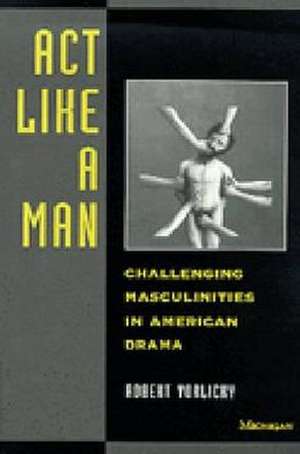Act Like a Man: Challenging Masculinities in American Drama
Autor Robert H. Vorlickyen Limba Engleză Paperback – 28 mar 1995
Plays in which women are absent are often characterized by the location of a male "other"—a female presence who distances himself from the dominant, impersonal masculine ethos and thereby becomes a facilitator of personal communication. The potential authority of this figure is so powerful that its presence becomes the primary determinant of the quality of men's interaction and of the range of male subjectivities possible. This formulation becomes the basis of an alternative theory of American dramatic construction, one that challenges traditional dramaturgical notions of realism.
The book will appeal to scholars and students interested in drama, gender, race, sexuality, and American culture, as well as playwrights, teachers of playwrights, and artistic directors. It includes an extensive bibliography of more than four hundred male-cast plays and monodramas, the first such compilation and one that points to further research into a previously unexplored area.
Preț: 206.40 lei
Nou
Puncte Express: 310
Preț estimativ în valută:
39.49€ • 41.35$ • 32.68£
39.49€ • 41.35$ • 32.68£
Carte indisponibilă temporar
Doresc să fiu notificat când acest titlu va fi disponibil:
Se trimite...
Preluare comenzi: 021 569.72.76
Specificații
ISBN-13: 9780472065721
ISBN-10: 0472065726
Pagini: 400
Ilustrații: 12 B&W photographs
Dimensiuni: 152 x 229 x 30 mm
Greutate: 0.63 kg
Ediția:New.
Editura: UNIVERSITY OF MICHIGAN PRESS
Colecția University of Michigan Press
ISBN-10: 0472065726
Pagini: 400
Ilustrații: 12 B&W photographs
Dimensiuni: 152 x 229 x 30 mm
Greutate: 0.63 kg
Ediția:New.
Editura: UNIVERSITY OF MICHIGAN PRESS
Colecția University of Michigan Press
Notă biografică
Robert Vorlicky is Associate Professor of English and Theatre, Marymount Manhattan College.
Recenzii
"A major addition to the study of gender not only in drama but in American literature in general; its textually specific investigation of the perceived need to act in order to possess a masculine identity will help to place dramatic literature at the center of all performative studies of gender. Act Like a Man is a work of deep scholarship and critical originality."
—Michael Cadden, Director of the Program in Theater and Dance, Princeton University
"An important and immensely worthwhile book, Vorlicky's ideas on masculinity and its effects will add considerably to current debates and discussions. He addresses issues of race and ethnicity in a very sophisticated manner, offering complex and intelligent readings of plays by men of color. Act Like a Man will engage a wide readership in theater and drama studies, women's and gender studies, gay studies, American studies, and cultural studies."
—David Román, University of Washington
"Vorlicky privileges gender over race and class, claiming that the majority of American male-cast drama is misogynist, homophobic, and racist because of the rid gender codings which underlie realism and patriarchal drama. The book attempts to look beyond this dominant, fixed code 'to reveal how the discourse coherence in [alternative] male-cast plays[s} arrives finally at sustained personal dialogue,' engaging men in mutual self-disclosure, avoiding violence and bringing about a new tolerance of difference. In calling for a revisioning of masculinity on the American stage, which would 'dramatize the diversity of men's lives, the range of masculinities,' Vorlicky's book is a most welcome contribution to the fields of gender studies and American drama."
—Theatre Insight
". . . an important addition to the growing number of fine books building on psychoanalytic, feminist, and gay critiques of masculinity."
—American Literature
"Vorlicky's book is a welcome contribution to the semiotics of drama, gender studies, and cultural studies. His in-depth rereadings of representative American male-cast plays at the intersection of gender, race, sex(uality) and ethnicity will surely become an influential point of reference and/or polemics for both students of drama and theatre practitioners."
—Theatre Studies
—Michael Cadden, Director of the Program in Theater and Dance, Princeton University
"An important and immensely worthwhile book, Vorlicky's ideas on masculinity and its effects will add considerably to current debates and discussions. He addresses issues of race and ethnicity in a very sophisticated manner, offering complex and intelligent readings of plays by men of color. Act Like a Man will engage a wide readership in theater and drama studies, women's and gender studies, gay studies, American studies, and cultural studies."
—David Román, University of Washington
"Vorlicky privileges gender over race and class, claiming that the majority of American male-cast drama is misogynist, homophobic, and racist because of the rid gender codings which underlie realism and patriarchal drama. The book attempts to look beyond this dominant, fixed code 'to reveal how the discourse coherence in [alternative] male-cast plays[s} arrives finally at sustained personal dialogue,' engaging men in mutual self-disclosure, avoiding violence and bringing about a new tolerance of difference. In calling for a revisioning of masculinity on the American stage, which would 'dramatize the diversity of men's lives, the range of masculinities,' Vorlicky's book is a most welcome contribution to the fields of gender studies and American drama."
—Theatre Insight
". . . an important addition to the growing number of fine books building on psychoanalytic, feminist, and gay critiques of masculinity."
—American Literature
"Vorlicky's book is a welcome contribution to the semiotics of drama, gender studies, and cultural studies. His in-depth rereadings of representative American male-cast plays at the intersection of gender, race, sex(uality) and ethnicity will surely become an influential point of reference and/or polemics for both students of drama and theatre practitioners."
—Theatre Studies
Winner: American Library Association (ALA) Choice Outstanding Academic Title
Descriere
How men communicate with each other on stage when no women are present—and what it tells us about power and gender
